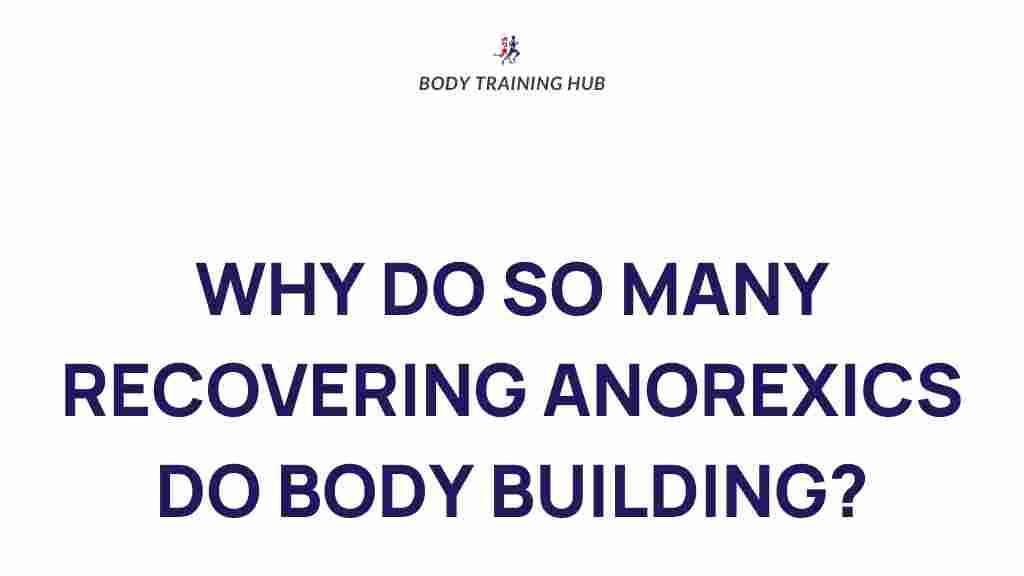Anorexia Recovery and Bodybuilding: A Path to Transformation
Anorexia nervosa is a serious mental health disorder characterized by an intense fear of weight gain and a distorted body image, leading individuals to restrict their food intake drastically. Recovery from anorexia is a multifaceted process that involves not just physical healing but also significant emotional and psychological growth. One surprising yet powerful avenue for those in anorexia recovery is bodybuilding. This article explores the fascinating link between anorexia recovery and bodybuilding, emphasizing how this physical activity can contribute to mental health, physical transformation, and muscle growth.
The Intersection of Anorexia Recovery and Bodybuilding
Bodybuilding, often perceived as a pursuit of aesthetics, can play a crucial role in the recovery process for individuals overcoming anorexia. Here’s how:
- Building a Positive Body Image: Engaging in bodybuilding can promote a healthier appreciation of the body. As individuals witness their physical transformation, they may develop a more positive body image.
- Enhancing Mental Health: The act of lifting weights and following a structured workout regimen can significantly boost mental health. Exercise releases endorphins, which can improve mood and reduce anxiety.
- Fostering Discipline and Structure: Bodybuilding requires a disciplined approach to training and nutrition, which can provide a sense of control and purpose during recovery.
- Encouraging Nutritional Awareness: Bodybuilding emphasizes the importance of nutrition, helping individuals learn about healthy eating habits and the role of food in muscle growth and recovery.
The Importance of Mental Health in Anorexia Recovery
Mental health is a critical component of recovery from anorexia. The psychological aspects of the disorder can often be as debilitating as the physical symptoms. Bodybuilding offers a constructive outlet for individuals to channel their energy and focus on positive changes in their lives. Here are some mental health benefits associated with bodybuilding during recovery:
- Increased Self-Esteem: Achieving fitness goals can enhance self-esteem and confidence, which are often diminished in individuals with anorexia.
- Stress Relief: Regular physical activity acts as a natural stress reliever, enabling individuals to cope better with the challenges of recovery.
- Community Support: Joining a gym or bodybuilding community can provide social support, which is vital for mental wellness.
Step-by-Step Process for Integrating Bodybuilding into Anorexia Recovery
Incorporating bodybuilding into an anorexia recovery plan requires careful consideration and a structured approach. Below is a step-by-step guide to help individuals embark on this journey.
Step 1: Consult with Professionals
Before starting any bodybuilding program, it is essential to consult with healthcare professionals, including a therapist and a nutritionist. They can provide tailored advice and ensure that the approach aligns with recovery goals.
Step 2: Set Realistic Goals
Setting achievable goals is crucial. Focus on small, incremental goals rather than drastic changes. For example:
- Increase workout frequency gradually.
- Focus on strength gains rather than weight changes.
- Set personal records for lifts rather than aesthetic goals.
Step 3: Develop a Balanced Workout Routine
A well-rounded bodybuilding routine should include:
- **Strength Training:** Incorporate compound movements like squats, deadlifts, and bench presses.
- **Cardio:** Include moderate cardio to support cardiovascular health without excessive calorie burning.
- **Flexibility Work:** Add stretching and mobility exercises to improve overall physical performance.
Step 4: Focus on Nutrition
Nutrition is a fundamental aspect of bodybuilding and recovery. A balanced diet rich in:
- **Proteins:** Essential for muscle growth.
- **Carbohydrates:** Provide energy for workouts.
- **Fats:** Support overall health.
Consider working with a nutritionist to create a meal plan that promotes muscle growth while ensuring adequate caloric intake.
Step 5: Monitor Progress and Adjust
Track your progress through workouts and physical changes. Adjust your routine as necessary to continue making gains and maintaining motivation. Use a journal or fitness app to log workouts, meals, and feelings.
Step 6: Celebrate Milestones
Recognize and celebrate achievements, no matter how small. This can foster a positive mindset and reinforce the progress made during recovery.
Troubleshooting Common Challenges
While bodybuilding can be beneficial, there may be challenges along the way. Here are some common issues and how to address them:
Challenge 1: Fear of Weight Gain
Many individuals in anorexia recovery may struggle with the fear of gaining weight. It’s crucial to remember that muscle growth requires a caloric surplus. Here are some tips:
- Focus on the benefits of strength training rather than weight.
- Regularly consult with a therapist to manage these fears.
- Keep a journal to express feelings and thoughts related to body image and weight.
Challenge 2: Lack of Motivation
Staying motivated can be difficult. To combat this:
- Change up your workout routine to keep things fresh and exciting.
- Find a workout buddy for accountability and support.
- Join a local bodybuilding class or community for inspiration.
Challenge 3: Nutritional Confusion
With the plethora of dietary advice available, it can be overwhelming. To simplify:
- Stick to whole foods and balanced meals.
- Consult a nutritionist for personalized guidance.
- Educate yourself through reputable sources about healthy eating.
Conclusion: Embracing the Transformation
The journey of anorexia recovery is profoundly personal and can be fraught with challenges. However, integrating bodybuilding into the recovery process can provide a pathway to not only physical transformation but also mental resilience and improved self-esteem. Through structured workouts, nutritional awareness, and community support, individuals can foster a healthier relationship with their bodies and themselves.
As you embark on this journey, remember that recovery is not a linear process—there will be ups and downs. But with determination, support, and the right approach, the link between anorexia recovery and bodybuilding can lead to significant positive changes in both mental health and physical well-being.
For further reading on mental health strategies, visit Mental Health America. To learn more about bodybuilding techniques, check out Bodybuilding.com.
This article is in the category Strength & Recovery and created by BodyTraining Team

1 thought on “Unveiling the Fascinating Link Between Anorexia Recovery and Bodybuilding”